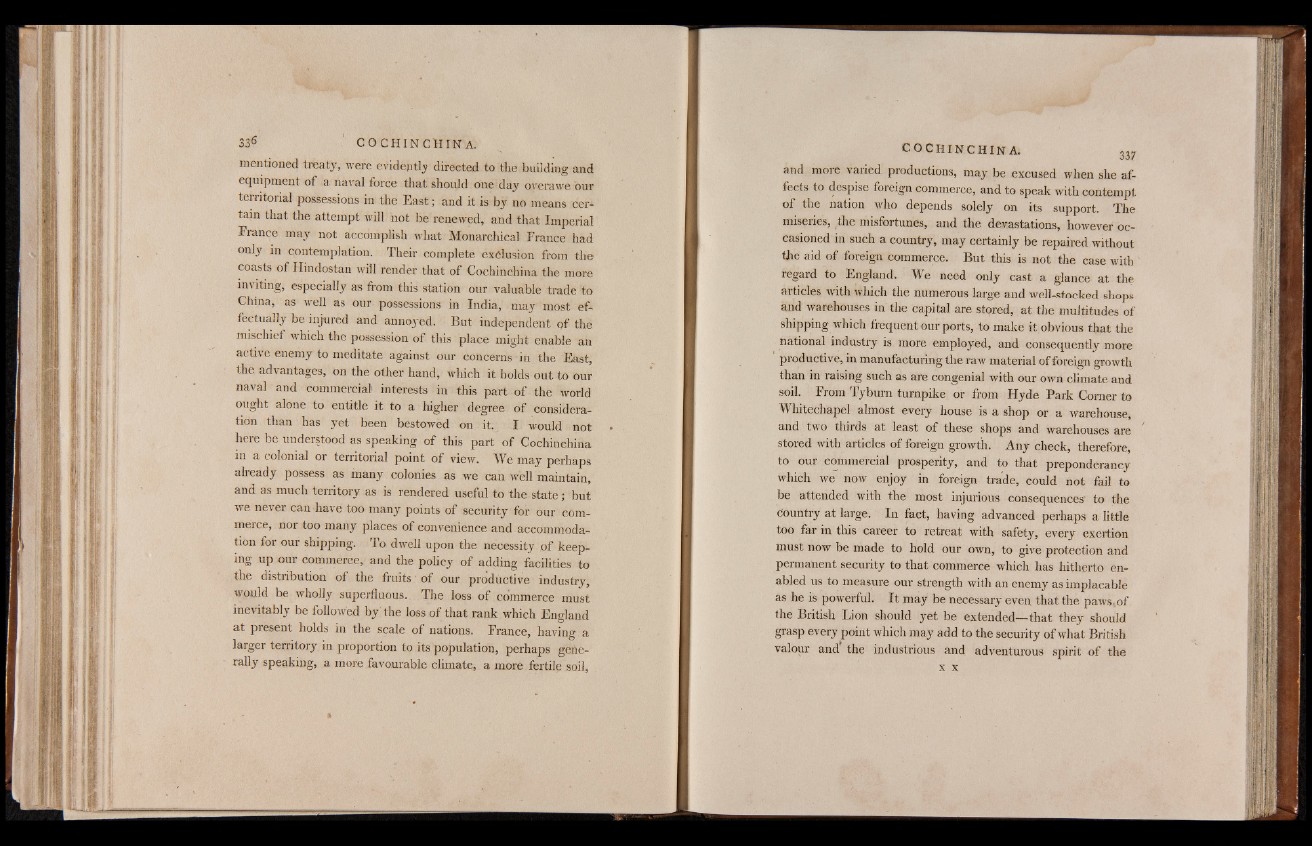
mentioned treaty, were evidently directed to the building and
equipment of a. naval force that should one day overawe bur
territorial possessions in the E a s t; and it is by no means cer-
tain that the attempt will not be renewed, and that Imperial
Eiance may not accomplish what Monarchical France had
only in contemplation. Their complete exclusion from the-
coasts of Hindostán will render that of Coc-hinchina the more
inviting, especially as from this station our valuable trade to
China, as well as our possessions in India, may most effectually
be injured and annoyed. But independent pf the
mischief which the possession of this place might enable an
active enemy to meditate against our concerns in the East,
the advantages, on the other hand, which it holds out to our
naval and commercial- interests in this part of the world
ought alone to entitle it to a higher degree of consideration
than has yet been bestowed on it. I would not
here be understood as speaking of this part of Cochinchina
in a colonial or territorial point of view. We may perhaps
already possess as many colonies as we can well maintain,
and as much territory as is rendered useful to the state; but
we never can have too many points of security for our commerce,
nor too many places of convenience and accommodation
for our shipping. To dwell upon the necessity of keeping
up our commerce, and the policy of adding facilities to
the distribution of the fruits of our productive industry,
would be wholly superfluous. The loss of commerce must
inevitably be followed by the loss of that rank which England
at present holds in the scale of nations. France, having a
larger territory in proportion to its population, perhaps generally
speaking, a more favourable climate, a more fertile soil,
and more varied productions, may be excused when she affects
to despise foreign commerce, and to speak with contempt
of the nation who depends solely on its support. The
miseries, the misfortunes, and the devastations, however occasioned
in such a country, may certainly be repaired without
the aid of foreign commerce. But this is not the case with
regard to England. We need only cast a glance at the
articles with which the numerous large and well-stocked shops
and warehouses in the capital are stpred, at the multitudes of
shipping which frequent our ports, to make it obvious that the.
national industry is more employed, and consequently more
productive, in manufacturing the raw material of foreign growth
than in raising such as are congenial with our own climate and
soil. From Tyburn turnpike or from Hyde Park Corner to
Whitechapel almost every house is a shop or a warehouse,
and two thirds at least of these shops and warehouses are
stored with articles of foreign growth. Any check, therefore,
to our commercial prosperity, and to that preponderancy
which we now enjoy in foreign trade, could not fail to
be attended with the most injurious consequences' to the
country at large. In fact, having advanced perhaps a little
too far in this career to retreat with safety, every exertion
must now be made to hold our own, to give protection and
permanent security to that commerce which has hitherto enabled
us to measure our strength with an enemy as implacable
as he is powerful. I t may be necessary even that the paws,of
the British Lion should yet be extended—that they should
grasp every point which may add to the security of what British
valour and the industrious and adventurous spirit of the
x x